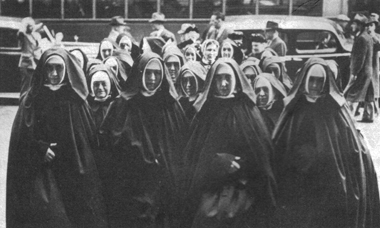
I was taught by Sisters of the Immaculate Heart of Mary and by the Order of Franciscans through the 1950’s and ‘60’s so I have a 12 years’ experience of their demeanor and vocation and their patience with the half-wits and minor demons I and my friends could be in their classrooms (only ever the boys). One of the regrets of my life is how they were sometimes treated by us — we, who understood nothing of their sacrifices. After having taught myself, I understand fully how hard they worked in elementary classrooms of 70, 80, 90+plus children (my third grade class had 93 students) for a serf’s wages and under the imperious ‘guidance’ of parish priests. Through a combination of fear and love, they taught us how to concentrate, how to be still, how to listen. In a very literal sense, they gave all of their lives to us.
Mid way through Alice Mcdermott’s The Ninth Hour, Sister Lucy of the Little Sisters of the Nursing Poor, a brusque, direct woman, sets to work cleaning and bathing Mrs. Costello, a one legged, self-pitying stay-at-home who lost her leg years before to infection from the bite of a stray dog and has done precious little to help herself since. McDermott takes several pages to describe their encounter — an intimate struggle between Sister Lucy’s unpitying act of goodness and Mrs. Costello’s genuine sadness and devouring neediness. I have never read a more subtle understanding of how practicing a devoted service to others must often overcome the servant’s dislike of the one being served. Sister Lucy is never rough, never bullying, but neither is she tender. She has other patients she must see. She has little patience for the “nonsense” of Mrs. Costello’s endless whining, but neither does she recognize the despair at the heart of Mrs. Costello’s life — crippled, alone all day while her husband works, reduced to charity help at the hands of ‘these nuns’. Somehow, and this is the mark of an accomplished novelist, she makes us see how this small, routine struggle and others like it in the book, are the skeletons of human life, the hard bones that lift the rest of our lives up into meaning and purpose and revelation.
A photo of The Little Sisters from the late 30’s.
 The Ninth Hour begins with a suicide in early twentieth century Brooklyn and then shows how that act, quickly forgotten by the larger world, infiltrates the lives of two families and one convent house of Catholic nuns. Sally, the daughter of the man who committed suicide is the primary character of the novel, but that can be a misleading description because the characters of the nuns, a large family, Sally’s mother, and others are drawn with such compassionate respect for their own individuality that we feel as if we know well a whole small cosmos of people by the time we come to the end.
The Ninth Hour begins with a suicide in early twentieth century Brooklyn and then shows how that act, quickly forgotten by the larger world, infiltrates the lives of two families and one convent house of Catholic nuns. Sally, the daughter of the man who committed suicide is the primary character of the novel, but that can be a misleading description because the characters of the nuns, a large family, Sally’s mother, and others are drawn with such compassionate respect for their own individuality that we feel as if we know well a whole small cosmos of people by the time we come to the end.
This is a quiet book, but it understands that what really forms the center of our lives is always personal, intimate, fundamental like forgiveness and mercy and simple endurance when life’s circumstances turn unfortunate. This is a quiet book but one with great heart. It left its mark on me.